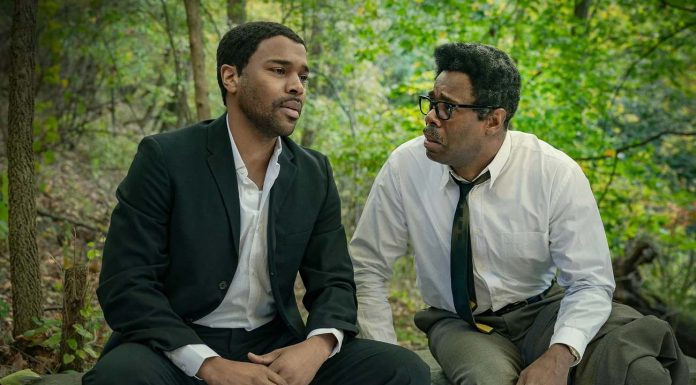“Rustin,” an American biographical drama released in 2023, centers on the compelling portrait of civil rights activist Bayard Rustin. The film, which is helmed by George C. Wolfe and stars Colman Domingo in the lead role, Chris Rock, Jeffrey Wright, and Audra McDonald, transports us to the time when Rustin was instrumental in planning the historic 1963 March on Washington for Jobs and Freedom.
The screenplay by Dustin Lance Black and Julian Breece, together with a tale by Breece, unravel Rustin’s life as the curtain rises on this gripping biopic. The film, which was made under the auspices of Higher Ground, the production firm founded by Barack and Michelle Obama, highlights Rustin’s contributions to the Civil Rights movement, which have frequently been overlooked by history. The way Colman Domingo plays Rustin captures the complexity of a guy trying to change the world in the face of social injustices. tvacute examines the nuances in which the character of Elias Taylor is based on a real person in the film Rustin
Who is Elias Taylor in the movie Rustin? & Who plays Elias Taylor?
Within the narrative fabric of “Rustin,” Elias Taylor is a compelling figure. Elias Taylor, portrayed by Johnny Ramey, is an activist and pastor who is deeply entwined with the plot to highlight the difficulties Rustin encountered as an out gay man in the 1960s. He is presented as a preacher who had an affair with Colman Domingo‘s character, Bayard Rustin, and a pregnant wife. “You may think you’re killing off of yourself, but you’re not,” Rustin says Elias when he tries to halt the affair in order to keep his wife and church intact. You’re killing all of yourself.” Rustin starts to suspect that Elias is being blackmailed by the FBI and that they have proof against him.
Born in California to Antoinette and Johnny Sr., Johnny Lynn Ramey Jr. studied at New York City’s prestigious Juilliard School. Johnny has had the good fortune to appear in, produce, write, and direct in a number of films. His appreciation for the arts began at a young age and has permeated every facet of his existence.
Is Elias Taylor in the movie Rustin based on a real person?
No, Elias Taylor in the movie “Rustin” is not based on a real person. A fictional character named Elias Taylor was developed for the movie in order to highlight the difficulties that openly gay man Bayard Rustin encountered in the 1960s. Although Elias Taylor is a composite character created to explore the societal barriers that real-life civil rights activist Bayard Rustin faced, particularly in relation to his sexuality, Rustin is a real person. Elias Taylor’s character is a creation of imaginative storytelling, not based on a real historical figure, as director George C. Wolfe has made clear.
Wolfe goes on, saying, “Bayard was ‘out,’ but he was out in 1963. He wasn’t out of 2023. How would you describe the points in Bayard’s evolution where he is and is not? I found Elias to be quite fascinating as a result. He is married, a Baptist, and from the South. In addition to not being Baptist or Southern, Bayard has come out as gay and totally accepts it.”
Even though Elias Taylor is a fictional character, he plays a significant role in the movie. He serves as Rustin’s counterpoint, highlighting the difference between a person bound by social norms and someone who has broken free from those confining bonds.
The movie depicts the difficulties Rustin had as a result of his sexual orientation within the larger framework of his life. Due to his open homosexuality during a period of widespread homophobia, Rustin faced opposition from both the Black and White communities. People who reflected on the difficulties Rustin faced, such as Rep. Adam Clayton Powell Jr. and NAACP Chief Roy Wilkins, voiced skepticism and hostility.
Elias Taylor’s decision to be a fictional character gives the story more complexity and enables the viewer to consider the intricacies of Rustin’s identity and the social norms he disobeyed. Through the character, the larger issue of emancipation and the various ways in which people express their authenticity are explored.
Although the movie is based on real events and highlights Rustin’s important contribution to the Civil Rights struggle, the introduction of Elias Taylor as a fictional character demonstrates the producers’ artistic license. Rustin’s struggles as an openly gay man trying to be authentic in a society that was reluctant to change are highlighted, in addition to his struggles as a leader in the civil rights movement.
Finally, “Rustin” serves as a monument to the complexity of Bayard Rustin’s life and the obstacles he surmounted in order to make a substantial contribution to the Civil Rights struggle. The film’s narrative decisions, such as the addition of Elias Taylor, give the plot additional depth and encourage viewers to consider how identity, authenticity, and societal expectations collide at a pivotal moment in American history. Viewers are invited to consider the age-old battles of individual liberation and the quest of justice in the face of hardship as they interact with the movie.







